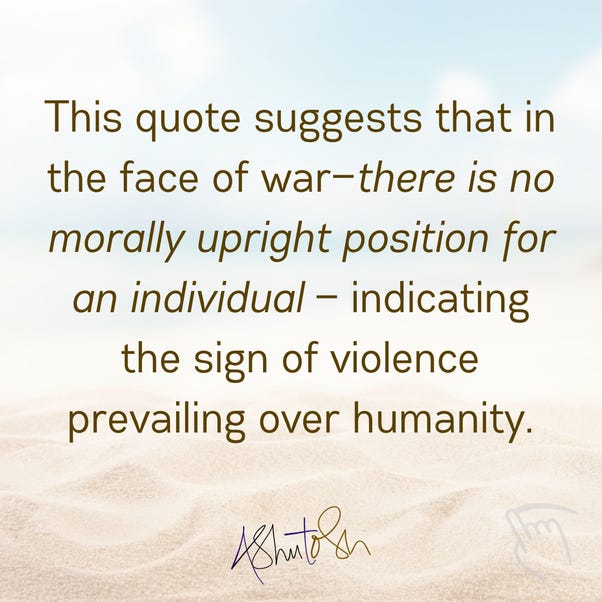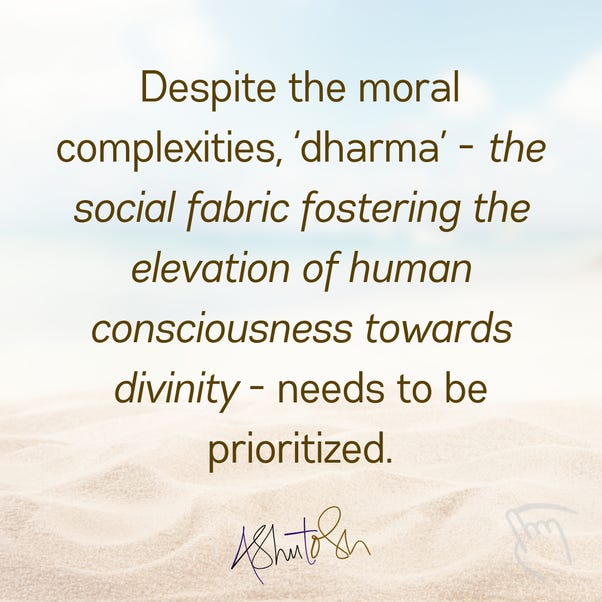Swadharma Unveiled: Spiritual Guidance in Modern Geopolitics
As the world teetering on the brink of an intense geopolitical boiling point, it becomes crucial to reflect on a set of scriptural takeaways for personal reflection to carve out a better world within
1. Philosophy
There are two roles for each one of us: Swadharma- societal responsibility & Sanatana dharma - spiritual responsibility. Bhagavad Gita 3.35 suggests we need to strike a balance between the two.
Specifically, devotees/seekers (globally) who come from a high end diplomatic, defense or political background with the nerve to face the wars should lead it from the frontline. And in that, the wisdom texts like Bhagavad Gita would serve as the essential navigational guide.
People inclined to engage at a global level in matters not just restricted to war, but even into politics, business & arts. If one is blessed with talents & a passion for positive contributions, it can't be ignored (BG 10.41). Recognize, this as your inner calling. It should be directed for the betterment of the society & for manifestation of the highest good.
2. In action
The on-ground reality may vary, particularly when aggressors resort to using human shields & express immoral intentions in a war-like situation that threatens the existence of humanity. This is precisely when spiritual training comes into play to handle situations that promote sustainable habitation of society.
Those with diplomatic & defense disposition must stand true to their nature actively working to repel aggressors and safeguard the nation from radical elements who love death over life.
History has witnessed such cases, where certain radical elements within a religion perpetrated ethnic cleansing, targeting indigenous religions, traditional cultures, & slavery enforcing slavery. These are a few chilling examples which reflect the failure of nations to train based on their swadharma.
It is true; there is no decent place to stand in a massacre.
Because that's the sign of violence winning over humanity. Therefore, proactive action is needed to nip conflict in the bud. The capability of every individual can be best exercised if they engage in professions that are close to their passion and competence. This is based on the principle of Varna - the ancient Vedic archetype that encourages people to choose their profession based on their interests and competency (BG 4.13).
3. War & Spirituality
From the history of Mahabharata, we learn how Krishna played the role of a diplomat to strike a peace accord between the warmongering Kauravas and the peace-loving Pandavas. However, despite every attempt for peace, the Kauravas remained unmoved. Thus, as it unfolded, the victory of good over evil emerged. Although it came at a great cost—the death of close to six million fighters—such efforts and capabilities should be developed if such tight-rope situations arise. Alternatively, the virtuous five Pandavas would have perished had they not adhered to their swadharma, training themselves as warriors to deliver a decisive blow to the notorious 100 Kauravas.
In closing, devotees should obviously chant for spiritual nourishment that's their Sanatana/spiritual dharma. Chanting connects us with the Lord, who gives us the intelligence to conduct our lives spiritually (BG 10.10). Simultaneously, we must actively participate in spreading goodness within society in every way possible, as it aligns with our Swadharma. Therefore, spirituality encompasses and embraces both Swadharma and Sanatana Dharma.
In war-like situations, from a Vedic perspective, there were battles where negotiations were not just rejected but often ignored. The goal was to establish 'dharma'—a cohesive and accommodating culture facilitating the elevation of human consciousness towards divinity. Any ideology posing a threat to this fabric needs to be disciplined, disempowered, and defanged. Period.
Hope you found this insightful. Until next time…







